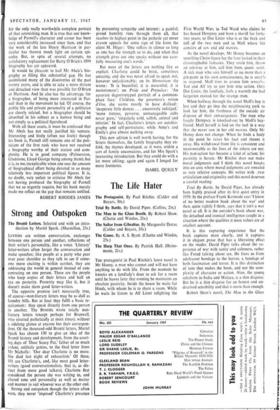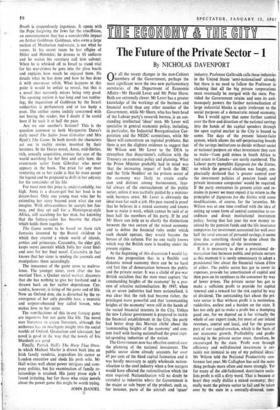The Life Hater
Trial By Battle. By David Piper. (Collins, 21s.) The Man in the Glass Booth. By Robert Shaw. (Chatto and Windus, 21s.) The Sailor from Gibraltar. By Marguerite Duras. (Calder and Boyars, 35s.) The Game. By A. S. Byatt (Chatto and Windus, 25s.) The Harp That Once. By Patrick Hall. (Heine- mann, 21s.) THE protagonist in Paul Ritchie's latest novel is Mr Honey, a man who cannot and will not have anything to do with life. From the moment he knocks on a landlady's door to ask for a room until he leaves later that evening he maintains an absolute passivity. Inside the house he waits for Hinds, with whom he is to share a room. While he waits he listens to Alf Lister refighting the First World War; to Ted Ward who claims he has boxed Dempsey and been a sheriff for forty- two years; to Dot Lister who is at the beck and call of the two men and to Moll whose life consists of sex and old movies.
As the novel develops, Mr Honey becomes an unwilling Christ-figure for the four locked in their claustrophobic fantasies. They revile him, throw an ash-tray at him, call him bum, queer, saint. A sick man who sees himself as no more than a pin-point in his own consciousness, he is unaLle to respond. Moll tries to arouse him sexually; Ted and Alf try to jeer him into action. Only Dot Lister, the landlady, feels a warmth she had forgotten existed for the strange man.
When halfway through the novel Moll's boy is lost and they go into the neighbouring park to look for him, the freshness of the outside air disposes of their extravaganzas. The man who fought Dempsey is knocked-out by Moll's boy- friend. Moll herself is laid on the turf in a way that she never saw in her old movies. Only Mr Honey does not change. When he finds a body
in the pond he raises his foot and shoves it
away. His withdrawal from life is consistent and unanswerable as the lives of the others are not.
His non-action has become a kind of action; his passivity is heroic. Mr Ritchie does not make moral judgments and I think this novel breaks into an area where moral judgments are revealed as very relative concepts. He writes with !;reat articulation and originality and this novel deserves a careful reading.
Trial By Battle, by David Piper, has already been highly praised after its first quiet entry in 1959. In the preface Frank Kermode says `I know of no better modern book about the war' and then, quite rightly I think, says that it isn't a war novel at all. It is the outsider's book about war, the detached and ironical intelligence caught in a situation where the qualities it most values are of smallest account.
It is this rupturing experience that the book captures most clearly, and it captures it in elegant prose that has a liberating effect on the reader. David Piper talks about the ex- perience of war with sanity and calmness, rather like Freud talking about sex. He frees us from adolescent bondage to the horror, a bondage of both fascination and terror. It is this distinction of tone that makes the book, and not the com- plexity of character or action. Alan, the young subaltern in India and Malaya, is a thin disguise. But he is a thin disguise for an honest and un- deceived sensibility and that is more than enough.
Robert Shaw's novel, The Man in the Glass Booth is stupendously ingenious. It opens with the Pope forgiving the Jews for the crucifixion, an announcement that has a considerable impact on Arthur Goldman. Goldman, who owns a large section of Manhattan real-estate, is not what he seems. In his secret room he has effigies of Hitler and Himmler; he dresses in SS uniform and he makes his secretary call him colonel.
When he is whisked off to Israel to stand trial for his war-crimes he goes into the glass booth and explains how much he enjoyed them. He details what he has done and how he has done it with enormous relish. What happens at this point it would be unfair to reveal, but this is a novel that narrowly misses being very good.
The opening section is too long and too confus- ing; the inquisition of Goldman by the Israeli authorities is perfunctory and at too hasty a pace. The author seems unduly concerned with not boring the reader, but I doubt if he could bore if he took it at half the pace.
Are we one another's fictions? This is the question common to both Marguerite Duras's early novel The Sailor from Gibraltar and Mrs Byatt's The Game. In both novels the characters act out in reality stories invented by their heroines. In the Duras novel, Anna, mid-thirties, rich, sexually acquisitive, cruises the seas of the world searching for her first and only loye, the evanescent sailor from Gibraltar who never appears in the book. The price for any Man venturing on to her yacht is that he must accept the legend and be prepared to drift in her odyssey for the remainder of his life.
For most men this price is, understandably, too high. Anna is a dream-girl but her boat is no
dream-boat. Only one young man wins her by extending her story beyond even what she can imagine. With ultra-coolness he accepts her fan- tasy, and they set sail for a Hemingway-style Africa, still searching for her man, but knowing that the fantasy-sailor has become the chain which holds them together.
The Game seems to be based on those rich fantasies invented by the Brontë children in which they created a whole world of islands, armies and princesses. Cassandra, the elder girl, keeps secret journals which Julia her sister finds and uses for her final novel. Cassandra in fact knows that her sister is reading the journals and manipulates them accordingly.
The innocence of the game turns to malevo- lence. The younger sister, even after she has married Thor, a Quaker social worker, discovers that she has nothing to give her husband and is thrown back on her earlier dependence. Cas- sandra, however, is tiring of the game and of life. Now an Oxford don, she is disturbed by the re- emergence of her only possible love, a neurotic and serpent-obsessed boy called Simon, who makes love to her sister.
The ramifications of this in-out fantasy game are ingenious but not quite like life. The novel uses literature to create literature, although the authoress has an intelligent insight into the social worlds of Oxford, Quakerism and television; her novel is good in the way that the novels of Iris Murdoch are good.
Finally, Patrick Hall's The Harp That Once, in which Michael Marler is drawn back into an Irish family vendetta, jeopardises his career as London executive and sheds his posh wife. Mr Hall writes well about power intrigues and com- pany politics, but his examination of family re- lationships is strained. His jazzy prose style I found irritating, but for those who enjoy novels about the power game this might be worth trying.
JOHN DANIEL































 Previous page
Previous page